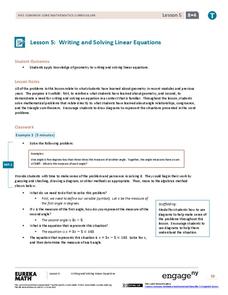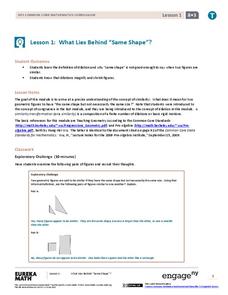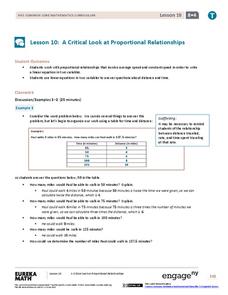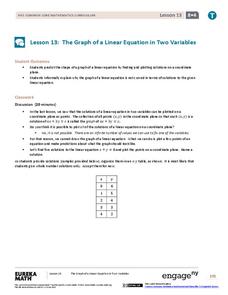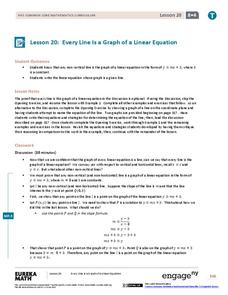Newspaper Association of America
Power Pack: Lessons in Civics, Math, and Fine Arts
Newspaper in Education (NIE) Week honors the contributions of the newspaper and is celebrated in the resource within a civics, mathematics, and fine arts setting. The resource represents every grade from 3rd to 12th with questions...
EngageNY
Mid-Module Assessment Task: Grade 7 Mathematics Module 3
Lesson 16 in the series of 28 is a mid-module assessment. Learners simplify expressions, write and solve equations, and write and solve inequalities. Most questions begin as word problems adding a critical thinking component to the...
EngageNY
Solutions of a Linear Equation
Use the distributive property to solve equations. The sixth lesson in a 33-part series has scholars solve equations that need to be transformed into simpler equations first. Class members apply the distributive property to the equations...
Curated OER
Algebraic Expressions & Equations
In this algebraic expressions and equations worksheet, 9th graders solve 12 various types of problems ranging from writing expressions for each written equation to solving 8 different word problems related to cost, speed, age, and...
EngageNY
Linear and Nonlinear Expressions in x
Linear or not linear — that is the question. The lesson plan has class members translate descriptions into algebraic expressions. They take the written expressions and determine whether they are linear or nonlinear based upon the...
EngageNY
Writing and Solving Linear Equations
Incorporate geometry into the solving linear equations lesson plan. Pupils use their knowledge of geometry to write linear equations which reinforces geometry measurement concepts while at the same time providing a familiar context...
EngageNY
Writing Division Expressions
Express division using different expressions. Individuals learn to write division expressions both with and without the division symbol in the 13th activity of a 36-part series. They consider both numerical and algebraic expressions...
Curated OER
Using Doubles
Bring this easy shortcut to your first grade addition lesson! By adding doubles (6+6, for example), and then adding or subtracting 1, kids learn how to solve simple addition problems with ease. This trick is especially helpful for...
EngageNY
Lines That Pass Through Regions
Good things happen when algebra and geometry get together! Continue the exploration of coordinate geometry in the third lesson in the series. Pupils explore linear equations and describe the points of intersection with a given polygon as...
Kentucky Department of Education
Multiplication Grade 3 Formative Assessment Lesson
Guide multiplication lesson plan instruction with a formative assessment. Mathematicians are given two multiplication problems to solve and represent using the area model, equal groups, repeated addition, and word problems. Following the...
EngageNY
Writing Equations Using Symbols
Build upon prior equation writing experience to create more complicated equations. Lesson one in a 33-part unit builds upon the class members' sixth and seventh grade experience of writing linear equations. Several examples...
EngageNY
Linear Equations in Two Variables
Create tables of solutions of linear equations. A instructional activity has pupils determine solutions for two-variable equations using tables. The class members graph the points on a coordinate graph.
EngageNY
Solving a Linear Equation
Solving an equation is the art of creating simpler equivalent equations using properties of equality. Here, classes see that solving an equation is not always as easy as guessing. The instructional activity presents linear equations that...
EngageNY
Base 10 and Scientific Notation
Use a resource on which you can base your lesson on base 10 and scientific notation. The second installment of a 35-part module presents scholars with a review of scientific notation. After getting comfortable with scientific...
EngageNY
What Lies Behind “Same Shape”?
Develop a more precise definition of similar. The lesson begins with an informal definition of similar figures and develops the need to be more precise. The class learns about dilations and uses that knowledge to arrive at a...
Chicago Teachers Union Quest Center
Factored Form of a Quadratic Function
Build upon linear functions to learn about quadratics. The lesson introduces the concept of zeros for quadratic functions and makes the connection to the linear factors of the function. It presents quadratics in both graphical and...
EngageNY
Factoring Expressions
Factor in an informative resource when teaching about factoring. The 11th lesson in a 36-part module shows pupils how to factor algebraic expressions by applying the distributive property. Some of the problems involve expressions with...
EngageNY
Complex Numbers as Vectors
Show your math class how to use vectors in adding complex numbers. Vectors represent complex numbers as opposed to points in the coordinate plane. The class uses the geometric representation to add and subtract complex numbers and...
EngageNY
Writing and Expanding Multiplication Expressions
Find out what's so standard about standard form. Scholars learn to write multiplication expressions with variables in the 10th lesson in a series of 36. They use different symbols for multiplication and translate between standard and...
West Contra Costa Unified School District
Introduction to Inverse Functions
Ready to share the beauty of the inverse function with your classes? This algebra II lesson guides the discovery of an inverse function through a numerical, graphical, and an algebraic approach. Connections are made between the three,...
Curated OER
Geometry Project
Proofs are usually an intimidating assignment. An engaging lesson focused on geometric proofs may reduce the anxiety! Pupils choose between several triangle proofs to complete and work on completing them. The...
EngageNY
A Critical Look at Proportional Relationships
Use proportions to determine the travel distance in a given amount of time. The 10th installment in a series of 33 uses tables and descriptions to determine a person's constant speed. Using the constant speed, pupils write a linear...
EngageNY
The Graph of a Linear Equation in Two Variables
Add more points on the graph ... and it still remains a line! The 13th installment in a series of 33 leads the class to the understanding that the graph of linear equation is a line. Pupils find several solutions to a two-variable linear...
EngageNY
Every Line is a Graph of a Linear Equation
Challenge the class to determine the equation of a line. The 21st part in a 33-part series begins with a proof that every line is a graph of a linear equation. Pupils use that information to find the slope-intercept form of the...





